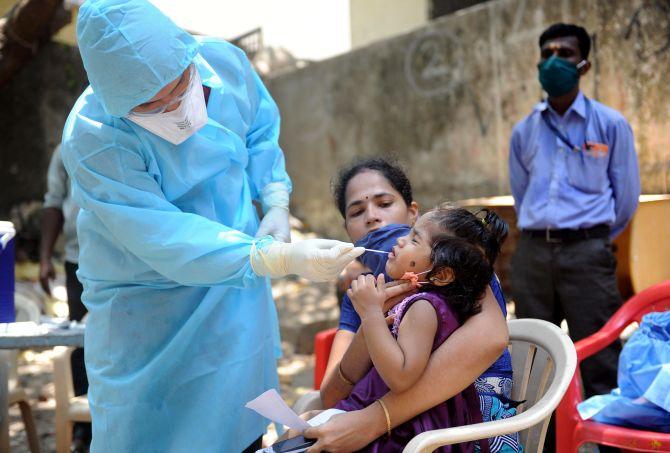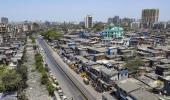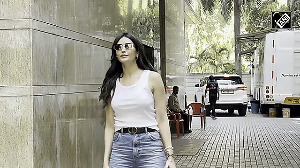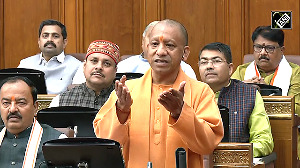'Corona will go on for more than six months now in Mumbai city.'
'It cannot vanish within just two or three months.'
'This infection may remain there in communities, somewhere or the other, like swine flu.'

Dr Balkrishna Adsul, Coordinator, COVID-19, Seven Hills hospital, north west Mumbai, has long experience in the city's public health, offers an update on the situation in Mumbai to Vaihayasi Pande Daniel/Rediff.com:
How Mumbai is coping:
Mumbai has a lot of awareness and testing for the corona.
That is one of the excellent things about Mumbai compared to other cities. We have developed many centres and facilities for testing in the city.
In the next few days cases are going to be a little more, actually.
Because if you are testing and doing proper counselling and selecting the patients for testing, there are definitely going to be more positives.
As of April 29, Mumbai has 5,900 cases and 1,993 have recovered.
In a viral infection, after two to three weeks, a person becomes negative, irrespective of treatment.
Only persons with co-morbid conditions -- diabetes, hypertension and chronic kidney diseases, those prone to SARI or severe acute respiratory infections -- they have a little risk of getting the complications and can deteriorate, but being in Mumbai city we have the facilities (for them).
All the experts are there (on board).
Under the medical task force, Dr Sanjay Oak (CEO of Prince Aly Khan hospital, who was appointed by the Maharashtra government to head the doctors task force) is there.
There are so many experts from the private sector helping.
Dr Niteen Karnik from Sion hospital (head of medicine at the Lokmanya Tilak Municipal Medical College and General Hospital, who is on the task force).
And all our hospital deans and team is there -- like Additional Municipal Commissioner Suresh Kakani, Dr N Ramaswami (former Navi Mumbai commissioner deputed to the BrihanMumbai Municipal Corporation in charge of the Seven Hills hospital), Ashwini Bhide (former MD, Mumbai Metro, deputed to the BMC in charge of contact tracing and the BMC control room, also liaising with hospitals), Manisha Mhaiskar (former additional municipal commissioner health during Mumbai's H1N1 and malaria outbreaks, deputed to be protocol officer to oversee detection and isolation of COVID-19 cases).
All of them are putting in 24/7 efforts to see that all patients, who are developing complications, can be saved -- their life gets saved and complications can be minimised and prevented.
That is an excellent thing, because patients who have symptoms or are asymptomatic and no comorbidity, they self-limit themselves and then they become alright in the course of two to three weeks.
The private sector is also coming forward to help in the treatment of the corona patients.
In two weeks, I think, definitely, we will be seeing a decline trend.

Preparations happening right now during the lockdown by the Municipal Corporation of Greater Mumbai:
We have to create awareness in the general public.
Counselling (at this time) is very important.
And contact tracing of a person, if s/he comes positive -- where is s/he staying, where were the contacts.
The contacts should be tested and isolated, if possible at home.
Otherwise, patients can be taken to the corona care centres at the various hotels.
There are many hotels where we are keeping them.
They can be isolated and become negative and then will not transfer to the community.
Contact tracing (is happening) at all the ward levels, in all the 24 wards, in our city.
It is going on, on a war footing in Mumbai.
The government is requesting doctors to start their private clinics, so that many patients can be treated there or in the nursing homes.
What will happen eventually:
Already many people are infected, showing symptoms.
If you test asymptomatic people, they are also showing a positive result.
But (eventually) people are going to develop herd immunity -- patients/people will start developing antibodies against the coronavirus antigen.
Overall, there will be a lot of development of herd immunity in the community, as such, all over Mumbai city.
That is definitely going to decrease the number of cases later.

How Mumbai will fare after the lockdown is lifted:
There may be more cases, maybe, difficult to say.
If those who are having the virus, positive people, if they come in contact with healthy people, who have low immunity or immunity-compromised people, like hepatitis B, cancer, HIV patients, they are definitely going to develop the infection.
Normal people, who, are going to develop the herd immunity, they will not get the infection.
Because of the lockdown, (the fact that Mumbaikars have learnt) the importance of self-caring (caring for yourself) is going to help.
Awareness has increased.
There have been a lot of behavioural changes of each and every individual.
That is going to help us a lot.
The majority should be able to accept this behavioural changes.
Then only it is possible.
Not just a few only.
Maintaining cleanliness and washing their hands -- this has to be made a habit by each and every individual of Mumbai city.
It will be able to prevent corona and also most of the viral infections and contact diseases.
If this habit (comes into force by residents), then definitely the incidence of the other viral illnesses will come down in Mumbai city too.
The monsoon is coming soon too and we are going to have too many monsoon illnesses, like gastroenteritis, leptospirosis.
They can be prevented, or minimized, by inculcating such behaviour -- of maintaining cleanliness, washing hands regularly and wearing a mask.
Corona will go on for more than six months now in Mumbai city.
It cannot vanish within just two or three months.
This infection may remain there in communities, somewhere or the other, like swine flu.
We have to change our behavioural habits for a long time -- permanently, actually.
Not going to see a decrease in the morbidity because of other factors.

Precautions for building societies:
On preventing building residents from taking walks within the compound: The idea of preventing all these things is so people do not come in contact.
People, once they come down (from their flats), they start (congregating), discussing and talking and may come in very close contact with each other and they transmit infection.
This should be like a thumb-rule.
Nobody should come out, so there is no chance of coming in contact and transmitting infection...
If you relax this, then it is very difficult to implement things.
On entry of outside people/delivery persons etc into a building society: They can stay outside the building society and one person (from a resident's family) can go and take whatever parcel they want (or got) and this way minimise the human being contacts, to prevent infection, in case the outside person (delivery person) may be a suspected case of corona.












 © 2025
© 2025